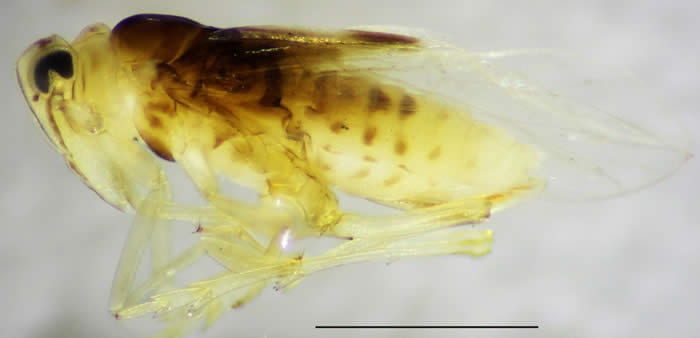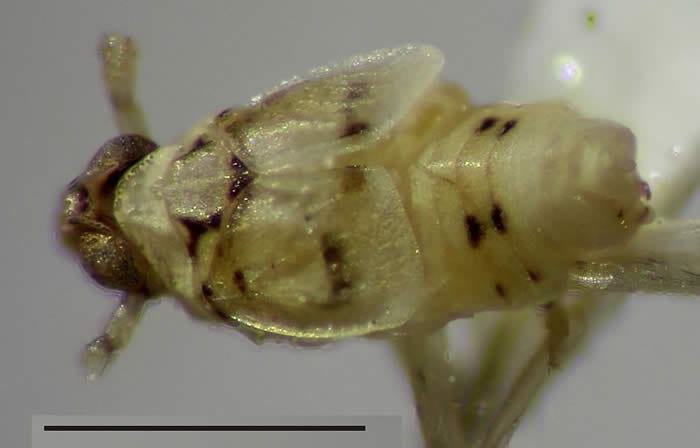[back to Higher Classification of Delphacidae]
[back to A checklist of New World delphacid species]
Contents
Family Delphacidae Leach, 1815
Subfamily Delphacinae Leach, 1815
Tribe Delphacini Leach, 1815
Genus Lepidelphax Remes Lenicov and Walsh, 2013: 1352.
(Note: date of publication may be Jan. 2014)
Synonyms: none
Type species: Lepidelphax pistiae Remes Lenicov and Walsh, 2013: 1352.
Distribution
Argentina
Recognized species
There is only a single species recognized in this genus
Lepidelphax pistiae Remes Lenicov and Walsh, 2013
Plant associations
Pistia stratiotes L. (Alismatales: Araceae) (Water Lettuce)
Plant Name from Tropicos
Economic Importance
A possible biocontrol agent and a specialist herbivore of Pistia stratiotes L. (Alismatales)
Recognition
de Remes Lenicov and Walsh (2013) describes this genus and species as “lender, compressed, rather long-legged, pale with distinctive pair of longitudinal dark brown to black stripes on face and several maculations on thorax and abdomen. Head with a shallow, small subapical areola on vertex continued into a distinctive simple median carina extended throughout frons and postclypeus. Male genitalia with a single subacute median process margined with a smaller rounded tooth on ventral margin of the pygofer.”
Lepidelphax pistiae photographs courtesy of Ana M. Marino de Remes Lenicov (División Entomología, Facultad de Ciencias Naturales y Museo, Universidad Nacional de La Plata, Buenos Aires, Argentina) (scale = 1mm)
Line art from de Remes Lenicov and Walsh, 2013
Online resources
[Still to come]
EOL
FLOW.
Discover Life
3I Interactive Keys and Taxonomic Databases (Dmitry Dmitriev)
Molecular resources
None.
Selected references
Presentation by Carey Minteer and Phil Tipping. “Evaluating new waterhyacinth and waterlettuce biological control agents in Florida” (PDF here).
Cabrera Walsh, G. and M. Maestro. 2014. Evaluation of intraguild interactions between two species of insect herbivores on Pistia stratiotes. Biological Control 76: 74-78. https://doi.org/10.1016/j.biocontrol.2014.05.005
Cabrera Walsh, G. and M. Maestro. 2016. Impact of introduced native herbivores on a Pistia stratiotes infestation close to the Paraná Delta in Argentina. Biocontrol Science and Technology 26(1): 35-46. https://doi.org/10.1080/09583157.2015.1072615
Cabrera Walsh, G., M. Maestro, A. Sosa, and P.W. Tipping. 2014. Specificity of Lepidelphax pistiae (Hemiptera: Delphacidae) to Pistia stratiotes (Araceae). Biocontrol Science and Technology 24(4): 485-488. Http:/doi.org/10.1080/09583157.2013.867012
2019. Host range of Lepidelphax pistiae (Hemiptera: Delphacidae) and its potential impact on Pistia stratiotes L. (Araceae), Biocontrol Science and Technology, 29:7, 706-714, DOI: 10.1080/09583157.2019.1587738
Leach, W. E. 1815a. Entomology. The Edinburg encyclopedia; conducted by David Brewster 9: 57-172. (family Delphacidae here).
de Remes Lenicov, A.M.M. and G. C. Walsh. 2013. A new genus and species of Delphacini associated to hydrophytic plants in Argentina (Hemiptera, Fulgoromorpha, Delphacidae). Florida Entomologist 96(4): 1350-1358.
de Remes Lenicov, A. M. M., B. Defea, J. Rusconi and G. Cabrera Walsh. 2016. Studies on the immature stages of the planthopper Lepidelphax pistiae (Hemiptera: Delphacidae), a potential biocontrol agent for the aquatic weed Pistia stratiotes (Araceae) from Argentina. Austral Entomology, 56: 384–391. https://doi.org/10.1111/aen.12248
Walsh, G. C., M. Maestro, A. Sosa and P. W. Tipping. 2014. Specificity of Lepidelphax pistiae (Hemiptera: Delphacidae) to Pistia stratiotes (Araceae), Biocontrol Science and Technology, 24:4, 485-488, https://doi.org/10.1080/09583157.2013.867012






